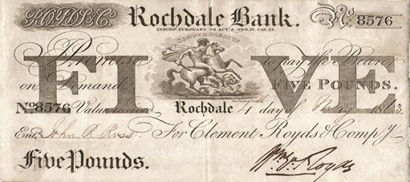Is Bitcoin the Answer?
What is money?
- what money really is
- where it comes from
- the fundamentals of how it moves between businesses, banks and countries
The Definition of Money
- "Money is coins and notes exchanged in trade." This is a poor attempt at a definition, but a popular one. Yes, some money is in the form of coins and notes, but vastly more is in the form of records, in bank accounts for example.
- "Money is a medium of exchange". Yes it is. This is a feature of money but this definition is inadequate because lots of things which are not money are also media of exchange. People often trade goods directly, so goods can be a medium of exchange, but they are not money. And besides, money is also a store of value. We don't define something by listing its attributes one by one. All that does is show us we can't put our finger on the essence of what we're talking about.
- "Money is a store of value". Yes it is. But so are houses, land, oil and cheese (if you happen to be a cheese merchant). None of these are money.
- "Money is wealth". No, it isn't. Lots of wealthy people have property but no money.
Money is a scorekeeping system for unreturned favours.
- Yes, it works for cash, a scorekeeping system which uses portable tokens, as well as for bank accounts, a scorekeeping system which uses records.
- Yes, you can see why you get money for working for someone, or perhaps for selling them something.
- Yes, it excludes bartered goods, and property, but does not exclude both property and money forming part of wealth.
- Yes, it allows for both storage and exchange, but can exist without either.
- Yes, it might be based on any of the exotic things we know have been used as money. It allows for anything which can be used to keep score, some of which are good for the purpose, and some not so good. We know people have used cowrie shells, broken sticks, coins made of all sorts of metals, banknotes, credit cards, bank accounts, promissory notes, bills of exchange, computer records, Bitcoins and lots of other things. They're perfectly entitled to. They are all systems for keeping score of unreturned favours, and they have all been the basis of valid, if mostly temporary, monetary systems.
Moving money around
What stimulates the creation of new types of money?
- Over recent years government's main economic lever has been monetary policy, by which it seeks (not very efficiently) to direct the way our economies behave, primarily through the manipulation of interest rates.
- Government operates a transparently simple policy when generating its own revenue. It looks for circumstances where our money changes hands, and it makes one side pay tax, and the other costlessly responsible for reporting and collecting it. That's why your income tax is paid by you and collected by your employer, why your VAT is paid by you and collected by your merchant, your Insurance Premium tax is paid by you and collected by your insurance company, and your travel tax paid by you and collected by your airline. The cost of money passing through private individuals' hands, as they earn it and spend it, is now frequently in excess of 60%.
- Government now puts the monetary system at the heart of its law and order policy. Until 2004 there were no particular qualifying criteria for using Pounds, Dollars, or Euros. Since then, having introduced a range of new Anti-Money-Laundering laws, government has made normal financial services businesses responsible for detecting and reporting the unrelated criminal behaviour of their clients. The penalties for doing something entirely normal, but in the service of a criminal, are now very severe, which is why people now looking for a bank account will already rate the process as up there with a visit to the dentist. Meanwhile the sadder aspect of this legislation is that it forced businesses to act as jury and judge on their customers, without there being a trial. Thousands of innocents – for example, people with Arabic sounding names – are now obstructed in their use of bank accounts by formal institutional prejudice triggered by this law, and the citizens of 12 countries deemed pervasively corrupt are automatically tagged as 'Politically Exposed Persons', which gets them routinely barred. The cost to business of its new policing function has been high, and the benefits have been undetectable; it doesn't seem to have reduced crime at all. After all, there are plenty of other scorekeeping systems for criminals to use.
Where does money come from?

How is money created?
'Naturally scarce' money
The two main money systems
- Falling collateral values can bust banks, losing depositors their money too. Multiple bank busts can spiral out of control into events like the Great Depression.
- Governments (and sometimes businesses too) mess with the bookkeeping by finding somewhere to park a bad debt where it never gets written off. Writing off a debt inconveniently eliminates the credit associated with it, establishing a painful loss for someone somewhere. So it suits fraudsters to pretend that non-performing or non-existent assets are neither. Parking a bad debt transforms the credit side into true 'fiat' money –money with neither inherent scarcity nor a collateral base – and is very similar to just printing banknotes. A big extension of this type of behaviour has been how the western world has coped with the 2007-9 financial crisis, which is another reason people are looking for an alternative.
- Forgery, which is essentially the same as the creation of fiat money, except that it's done by wicked criminals instead of governments.









 Email us
Email us